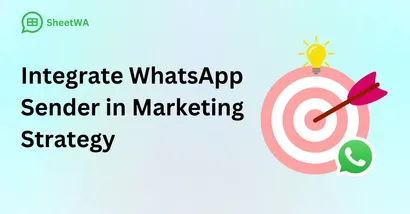
Introduction
Have you ever considered how WhatsApp, beyond being a personal messaging platform, can revolutionize your business communication? With over 2 billion active users, WhatsApp has morphed into a vital tool in the marketing arsenal of many businesses. At the heart of this transformation are WhatsApp sender plugins, powerful extensions that integrate seamlessly into your marketing strategies.
In this article, you will learn:
The compelling advantages of using WhatsApp sender plugins for your marketing efforts.
A step-by-step guide to effectively integrate these dynamic tools into your business.
Essential tips to maximize the impact and engagement of your WhatsApp marketing campaigns.
Harnessing the power of WhatsApp sender plugins can elevate your customer interactions to new heights, offering a blend of personalization and efficiency. Let’s dive into how you can make the most of this innovative tool to enhance your marketing strategy.
The Rise of WhatsApp in Business Communication
The surge in using WhatsApp for business communication is not just a trend; it's a strategic shift. Globally, businesses are tapping into WhatsApp's vast user base to connect with customers more personally and effectively. Here's a look at how WhatsApp is transforming the business communication landscape:
WhatsApp's Expanding Footprint in Business: With over 2 billion users, WhatsApp offers an unparalleled platform for businesses to reach a broad audience. Its simple interface and widespread popularity make it a go-to choice for companies looking to enhance customer engagement.
Success Stories Across Industries: From retail to services, businesses are leveraging WhatsApp to streamline customer interactions, provide support, and even close sales. For instance, airlines use WhatsApp for ticket booking confirmations and updates, while retail brands offer personalized shopping experiences through the app.
The Numbers Speak: Statistics show that WhatsApp messages have a 98% open rate, significantly higher than traditional emails. This level of engagement presents a huge opportunity for businesses to connect with their audience in a more direct and impactful way
The integration of WhatsApp into business communication strategies signifies a shift towards more instant, interactive, and personal customer interactions. As we continue to see this platform's role in business grow, it becomes clear that WhatsApp is not just an app but a crucial business communication tool.
Understanding WhatsApp Sender Plugins
In the digital marketing landscape, WhatsApp sender plugins have emerged as a game-changer for businesses. But what exactly are these plugins, and how do they function? Let's break it down:
Defining WhatsApp Sender Plugins: Essentially, WhatsApp sender plugins are software add-ons that integrate with a business's existing digital platforms – like websites, CRM systems, or e-commerce stores. They enable direct communication with customers via WhatsApp, streamlining processes like customer support, marketing, and sales.
Types of WhatsApp Sender Plugins:
The market offers a variety of plugins, each designed to cater to different business needs:
Automated Response Plugins: These plugins can automatically send predetermined messages or responses based on customer interactions, making customer engagement more efficient.
CRM Integration Plugins: Some plugins are designed to integrate seamlessly with Customer Relationship Management (CRM) systems, enabling businesses to manage customer conversations and data more effectively.
E-commerce Integration Plugins: For online retailers, specific plugins can integrate with e-commerce platforms, facilitating real-time customer support and transaction updates directly through WhatsApp.
Functionality: The functionality of these plugins extends beyond just sending messages. They can be programmed to perform tasks like scheduling appointments, sending product updates, and even processing orders, all within the familiar interface of WhatsApp.
By understanding the capabilities and types of WhatsApp sender plugins, businesses can make informed decisions about which plugins best suit their needs. These tools not only enhance customer communication but also open up new avenues for marketing and sales strategies.
Benefits of Integrating WhatsApp Sender Plugins
Integrating WhatsApp sender plugins into your marketing strategy offers a multitude of benefits, significantly enhancing the way you connect with your audience.
Here are some of the key advantages:
1. Enhanced Customer Engagement: WhatsApp's personal and conversational nature makes it an ideal platform for engaging with customers. By using sender plugins, businesses can automate and personalize their interactions, ensuring a consistent and responsive communication channel that resonates with customers.
2. Improved Response Times and Customer Service: With features like automated responses and easy access to customer data, WhatsApp sender plugins enable businesses to respond to customer inquiries and concerns promptly. This rapid response capability can significantly improve customer satisfaction and loyalty.
3. Increased Conversion Rates: The direct and personal communication facilitated by WhatsApp can lead to higher conversion rates. Businesses can use these plugins to send targeted messages, promotional offers, and product updates, nudging customers further down the sales funnel.
4. Efficient Marketing Automation: WhatsApp sender plugins allow for the automation of various marketing tasks, such as sending out bulk messages, reminders for events or sales, and follow-up messages post-purchase. This automation saves time and resources while maintaining a high level of customer engagement.
5. Data-Driven Insights: Many WhatsApp sender plugins come with analytics features, providing valuable insights into customer behavior, message effectiveness, and engagement rates. These insights can inform and refine your overall marketing strategy.
Integrating WhatsApp sender plugins into your marketing strategy not only streamlines communication with customers but also opens up new avenues for increasing engagement and driving sales. It’s a strategy that blends the personal touch of direct messaging with the efficiency of digital automation.
Steps for Effective Integration
Integrating WhatsApp sender plugins into your marketing strategy requires careful planning and execution.
Here’s a step-by-step guide to ensure effective integration:
1. Choosing the Right WhatsApp Sender Plugin:
Assess Your Needs: Determine what you need from a WhatsApp sender plugin. Are you looking for automation, CRM integration, customer support, or sales facilitation?
Research Options: Explore the different plugins available in the market. Look for reviews, features, and compatibility with your existing systems.
Test for Compatibility: Ensure the plugin you choose integrates smoothly with your website, e-commerce platform, or CRM system.
2. Setting Up and Customizing the Plugin:
Installation: Follow the specific installation instructions for the plugin. This might involve adding code to your website or configuring settings in your CRM system.
Customization: Tailor the plugin to align with your business’s branding and communication style. Customize automated messages, chat flows, and response templates to reflect your brand voice.
3. Integrating the Plugin with Existing Marketing Tools and CRM:
Data Syncing: Set up the plugin to sync with your CRM system, ensuring that customer interactions on WhatsApp are logged and accessible.
Marketing Automation Integration: Connect the plugin with your marketing automation tools to streamline your campaigns across different channels.
4. Training Your Team:
Educate Your Staff: Ensure your team understands how to use the plugin effectively. Provide training on responding to WhatsApp messages, using automation features, and accessing customer data.
5. Launch and Monitor:
Go Live: Once everything is set up, launch the plugin and start communicating with your customers via WhatsApp.
Monitor Performance: Keep an eye on how the plugin is performing. Analyze metrics such as response times, customer satisfaction, and conversion rates.
6. Continuous Improvement:
Gather Feedback: Regularly seek feedback from your team and customers on the WhatsApp interaction experience.
Iterate and Improve: Use feedback and performance data to make continuous improvements to your WhatsApp marketing strategy.
Effectively integrating WhatsApp sender plugins requires thoughtful selection, meticulous setup, and ongoing management. By following these steps, businesses can harness the full potential of WhatsApp to enhance their marketing and customer engagement efforts.
Best Practices and Tips
To maximize the effectiveness of WhatsApp sender plugins in your marketing strategy, here are some best practices and tips to keep in mind:
1. Crafting Engaging and Personalized Messages:
Personalization is Key: Use customer data to personalize messages. Address customers by name and reference their past interactions or preferences to make the communication more relevant and engaging.
Keep It Conversational: WhatsApp is a conversational platform, so keep your tone friendly and approachable. Avoid overly formal language.
2. Adhering to WhatsApp’s Policies and Regulations:
Understand the Rules: Familiarize yourself with WhatsApp’s business policies, including consent requirements and message formatting rules.
Avoid Spammy Behavior: Ensure your messages are valuable to the recipient and avoid sending unsolicited or bulk messages that could be perceived as spam.
3. Monitoring and Analyzing Effectiveness:
Track Key Metrics: Monitor metrics like response rate, message read rate, and customer feedback. These indicators will help you gauge the effectiveness of your WhatsApp marketing.
Use Insights for Improvement: Analyze the data collected to identify areas for improvement. Adjust your messaging strategy based on what works best with your audience.
4. Regularly Update Your Strategy:
Stay Current: Keep up with the latest features and updates offered by WhatsApp and your chosen plugin. Incorporate new functionalities into your strategy to stay ahead of the curve.
Evolve with Customer Preferences: As customer behavior and preferences change, so should your WhatsApp marketing approach. Stay attuned to your audience’s needs and adjust your strategy accordingly.
5. Integrating with Other Marketing Channels:
Create a Cohesive Strategy: Ensure that your WhatsApp marketing efforts are in sync with other channels like email, social media, and your website. This creates a seamless experience for your customers across all touchpoints.
By following these best practices and tips, businesses can effectively leverage WhatsApp sender plugins to enhance their marketing strategies, foster better customer relationships, and drive more conversions.
Case Studies
To illustrate the real-world impact of integrating WhatsApp sender plugins into marketing strategies, let’s explore a few case studies:
1. Retail Industry Success:
Background: A mid-sized retail brand implemented a WhatsApp sender plugin to enhance customer service and promote flash sales.
Implementation: They used automated messages for welcoming customers, providing product recommendations, and sending personalized offers based on customer purchase history.
Outcome: The brand saw a 25% increase in customer engagement and a 15% rise in sales attributed to personalized WhatsApp promotions.
2. Service Industry Efficiency:
Background: A travel agency adopted a WhatsApp plugin to streamline customer interactions and provide real-time travel updates.
Implementation: The agency set up automated responses for common queries and integrated the plugin with their booking system to send trip confirmations and updates.
Outcome: Customer satisfaction ratings improved by 30%, and the response time for customer inquiries decreased by 50%.
3. E-commerce Platform’s Enhanced Connectivity:
Background: An e-commerce platform integrated WhatsApp to offer instant customer support and cart abandonment reminders.
Implementation: They utilized the plugin for sending automated reminders with personalized discounts and real-time support for customer queries.
Outcome: The platform experienced a 20% reduction in cart abandonment and a significant increase in customer retention rates.
These case studies demonstrate the versatility and effectiveness of WhatsApp sender plugins across various industries. By tailoring the plugin’s features to specific business needs, companies can enhance customer engagement, improve operational efficiency, and boost their overall marketing performance.
Conclusion
Integrating WhatsApp sender plugins into your marketing strategy represents a significant step towards modernizing your business communication. As we've seen through various case studies, the right implementation of these tools can lead to enhanced customer engagement, improved operational efficiency, and a noticeable increase in sales and customer satisfaction. Whether it's through personalized messaging, streamlined customer service, or targeted marketing campaigns, WhatsApp sender plugins offer a versatile and effective solution to meet today's dynamic business challenges.
As you embark on integrating these powerful tools into your marketing strategy, remember the key takeaways: choose the right plugin, customize it to fit your business needs, adhere to WhatsApp's policies, and continuously monitor and refine your approach for the best results.
FAQs
Q: Can WhatsApp sender plugins be used for automated customer service?
A: Yes, many WhatsApp sender plugins offer automated response features, allowing businesses to provide instant customer service and support.
Q: How do WhatsApp sender plugins comply with privacy regulations?
A: Reputable WhatsApp sender plugins are designed to comply with privacy laws and regulations, including GDPR. They ensure customer data is handled securely and with consent.
Q: Are there any limitations to using WhatsApp sender plugins for marketing?
A: While WhatsApp sender plugins are versatile, businesses should be aware of limitations such as message formatting rules, consent requirements for messaging, and avoiding spam-like behavior.
